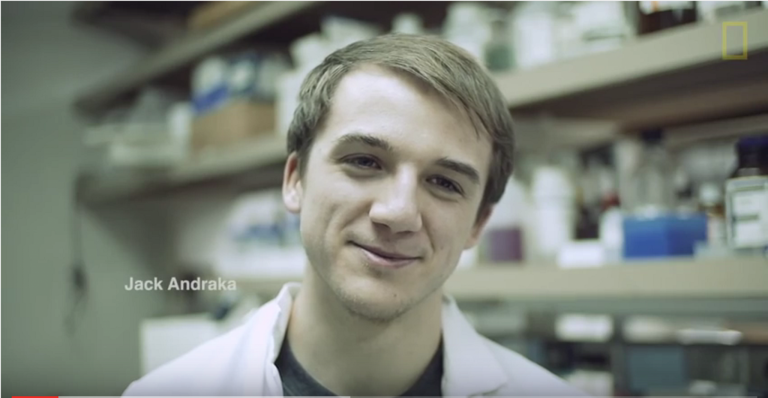
As a fourteen-year-old high school freshman, Jack Andraka received international recognition for a ground-breaking discovery after his idea was turned down by no less than 199 labs.
Passionate about science, Jack decided to undertake his own research project after tragically losing a friend to pancreatic cancer.
The disease is notoriously difficult to spot, since the internal position of the pancreas is difficult to scan and there are usually no visible symptoms. This often means that by the time the sufferer seeks medical assistance, the illness has already spread to other parts of the body.
An estimated 72 percent of pancreatic cancer patients die within one year of being diagnosed, and more than 40,000 people lose their lives to the disease each year.
Devastated by the death of his friend, Jack turned his grief into something positive and attempted to create a reliable test that could detect pancreatic cancer quickly and efficiently.
The young man conducted his own thorough research, learning all he could about the disease and its biomarkers – components of the disease that can be easily monitored. Mesothelin, a protein produced in the early stages of pancreatic cancer, is one such biomarker.
One day, when Jack’s teacher was giving a lesson on antibodies, proteins that attach to the blood to help remove foreign antigens, the budding scientist began to read an article about carbon nanotubes; small, cylindrical carbon molecules that are approximately 1/50,000th the diameter of a human hair.
That’s when Jack had a brainwave: if the carbon nanotube network was to be coated with mesothelin, the antibodies would bind to it and get bigger.
As the molecules began to swell, the nanotubes would also expand and alter the network’s electrical properties. Not only would this change occur rapidly, it would also be easy and affordable to measure.
In order to test his hypothesis, Jack went home that day and immediately began to construct a budget, procedure, catalogue of materials and a timeline of progression that he could send to cancer research labs and ask for their help.
Of the 200 labs Jack sent his idea to, 199 turned him down.
But Dr Anirban Maitra, former professor of Oncology at Johns Hopkins University, now chief researcher into pancreatic cancer at the University of Texas MD Anderson Cancer Center in Houston, sent back a resounding yes.
“It was a very unusual email,” Maitra told Smithsonian Magazine. “I don’t often get emails like this from postdoctoral fellows, let alone high school freshmen.”
Dr Maitra invited the student to the lab at Johns Hopkins University, where with the help of a qualified team of PhD researchers, Jack would be able to test out his hypothesis.
After seven long months of after-school and weekend study, including preliminary tests and careful revisions, Jack’s revolutionary idea finally started to work.
After receiving the Gordon E. Moore Award back in 2012, Jack won the top prize at the Intel International Science and Engineering Fair, and has earned a number of prestigious honours from global organisations.
His work is still in the initial stages and is yet to be published as it still requires research. But the young man holds the patent for his pioneering discovery, which he is licensing to pharmaceutical companies so they can begin crucial clinical trials.
“I don’t…wanna end up as a lab rat,” Jack told 60 Minutes. “I kind of want to be able to come up with a new idea and then really just move on to the next idea, and have other people do the repetitive trials.”
Now 19, Jack is in his first year of study at Stanford University, giving lectures about his experience all over the world – he has even written his own memoir BreakThrough, encouraging his generation to approach their pursuits with an attitude of gumption and determination.
– Young man, wherever you currently are in the world, your friend is looking down on you with immense gratitude and pride.
WE SALUTE YOU!
Additional reporting by Upworthy.
Image via National Geographic.







